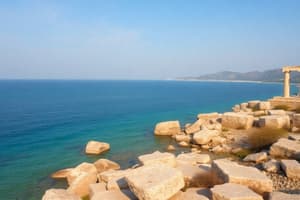Podcast
Questions and Answers
What was a significant aspect of Greek religious beliefs during the period of 1200 to 800 BCE?
What was a significant aspect of Greek religious beliefs during the period of 1200 to 800 BCE?
- The gods were viewed as flawed and emotional beings that often fought amongst themselves. (correct)
- The focus was solely on personal immortality and the afterlife.
- Religion had little impact on everyday life and governance.
- The gods were seen as benevolent and rarely intervened in human affairs.
What form of political structure emerged in Greece after 800 BCE?
What form of political structure emerged in Greece after 800 BCE?
- A centralized empire ruled by a single monarch.
- City-states, known as POLIS, that were politically autonomous. (correct)
- A theocratic system governed by religious leaders.
- A democratic federation with equal representation for all regions.
What was a common theme in early Greek art and architecture?
What was a common theme in early Greek art and architecture?
- The portrayal of individual achievements and notable figures.
- A focus on idealized representations rather than individual uniqueness. (correct)
- Architecture emphasized functionality over aesthetic appeal.
- Art was primarily used for mundane purposes like decoration.
How did the concept of heroism influence Greek culture during this period?
How did the concept of heroism influence Greek culture during this period?
What characterized the Greek understanding of the afterlife during this era?
What characterized the Greek understanding of the afterlife during this era?
What was a major consequence of the Persian invasion for Greek society?
What was a major consequence of the Persian invasion for Greek society?
Which characteristic was prominent in the portrayal of figures in Greek art after the Persian invasion?
Which characteristic was prominent in the portrayal of figures in Greek art after the Persian invasion?
How did Greek nationalism manifest after the Persian Wars?
How did Greek nationalism manifest after the Persian Wars?
Which statement accurately describes the voting system in Athens during this time?
Which statement accurately describes the voting system in Athens during this time?
What is a significant misconception about the Persian Empire as viewed by the Greeks?
What is a significant misconception about the Persian Empire as viewed by the Greeks?
Flashcards are hidden until you start studying
Study Notes
Aegean Decentralization (1200-800 BCE)
- The period between 1200 and 800 BCE was marked by political decentralization and material poverty in the Aegean region.
- This period followed a period of invasion, which likely contributed to the decline of centralized power.
The Polis (After 800 BCE)
- Starting around 800 BCE, the city-state structure known as the polis emerged across the Aegean world.
- These city-states were autonomous, meaning they were independent and self-governing.
- Cities competed with one another in various aspects, including economics, culture, and military affairs.
- The polis system spread from the Greek mainland and islands to colonies in Asia Minor, North Africa, and other regions.
Greek Religion
- Greek gods were believed to possess supernatural powers, however, they were also depicted as having human-like qualities.
- Gods were prone to conflict and had emotions, vendettas, weaknesses, and flaws.
- The Greek afterlife was shrouded in mystery and generally viewed as an undesirable state.
- The gods were believed to only help the living.
Emphasis on the "Here and Now"
- Greeks believed that telling stories about a person after death was the best hope for a "good" afterlife.
- The warlike nature and the perceived shortcomings of the afterlife led to a strong emphasis on the present.
- There was a strong focus on the importance of human life in the here and now.
Greek Humanism
- Greeks emphasized human achievements, particularly heroism and athleticism.
- Greek art often portrayed idealized male bodies, showcasing strength and beauty.
- Greek culture had a strong emphasis on human stories and experiences, a concept known as Greek Humanism.
Art & Architecture
- Greek art and architecture emphasized idealistic representations.
- Artists were less interested in individual portraits and more interested in representing ideal types of figures.
- Architects developed standard decorative elements for buildings, emphasizing a sense of order and harmony.
Thematic Representations in Art
- Early Greek art frequently depicted scenes of war and conflict between Greek city-states.
- Later art, particularly following the Persian Wars, often depicted Greek victories against non-Greek enemies, but also continued to portray conflict amongst the Greek themselves.
The Persian Wars: A Turning Point in Ancient Greece
- The Persian Empire conquered many Eastern polities.
- The destruction of the Athenian Acropolis in 480 BCE by Persian troops was a major turning point in Ancient Greek history.
- The event served as a catalyst for the creation of the Delian League, a defensive alliance modeled on a "NATO" structure.
- The Delian League aimed to protect member polities against Persian aggression and was financed through taxes.
- The Persian Wars promoted a sense of Hellenic unity and nationalism among Greeks.
- The Athenian democracy at the time granted voting rights only to free adult male citizens, representing a small minority of the population.
- Greek nationalism post-Persian invasion can be seen as a form of "us vs. them" tribalism.
Artistic Impact of the Persian Wars
- The Persian War influence on Greek art manifested in the portrayal of idealized, heroic figures with calm expressions.
- The art showcased a strong emphasis on full naturalism.
- The architecture of the time celebrated the "us vs. them” theme by displaying coherent sculptural programs.
Studying That Suits You
Use AI to generate personalized quizzes and flashcards to suit your learning preferences.




